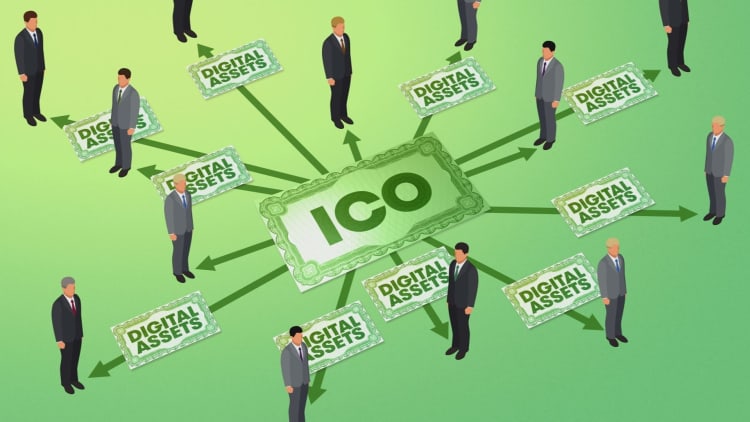
A new controversial way of raising funds with less regulation has captivated the attention of investors, it's called an initial coin offering, or ICO.
An ICO is a fundraising vehicle, typically for start-ups. Investors send some form of currency, usually bitcoin or ethereum, to the company. In exchange, they get an entirely new cryptocurrency.
But before you bet your retirement on the next initial coin offering, beware of the risks.
First is you'll have fewer rights.
An ICO is a lot like an initial public offering, but instead of getting shares in return, investors get digital assets, called tokens. One major distinction — tokens typically don't give investors any equity stake or voting rights in the underlying company. That means you're just betting that the coins will increase in value over time.
The second risk is limited regulation. If a company you've bought coins from decides to run away with your tokens, there is a high chance you will not be able to get them back. There is no dedicated "ICO regulator."
Sure, there is the SEC, but ethereum co-founder Charles Hoskinson says it has become increasingly more challenging to regulate this new asset class given its highly technical nature and global reach.
"Problem is, this is an intrinsically global marketplace ... the old financial world used to work where you had a bunch of hubs ... we now live in a [world] where cryptocurrencies have turned every phone into a bank. So regardless of what a regulator says ... people don't actually have to comply. The cost of compliance is pretty low," Hoskinson told CNBC.
While the SEC has warned investors to be cautious when investing in ICOs, its actions have been conservative and measured.
"They have taken a feasible approach to stop, look and listen. Security laws can be applied to some of these offerings," said Paul Atkins, former SEC commissioner, to CNBC.
Less regulation is one of the reasons start-ups have found coin offerings to be an efficient way to raise funds.
So far this year, start-ups have raised $1.25 billion via initial coin offerings, surpassing early stage VC funding, that according to CB Insights.
Venture capital firms are paying attention.
Filecoin recently raised money via an ICO from Sequoia Capital and Union Square Ventures, two respected VC firms in Silicon Valley.
And this may be only the start.
"I say we're in the very early stage of an exciting new technology," said Matt Huang, partner at Sequoia Capital.
Still, a growing number of experts inside the cryptocurrency space say the ICO market could crash, most likely driven by a large-scale regulatory crackdown, or a failure involving a large company that has participated in a token offering.
"Hard to know what the exact trigger would be ... but these things tend to cascade," said Hoskinson.
So when is it coming?
"If I had to guess ... in the next six to 12 months," said Hoskinson.
Until then, more start-ups are rushing to get in on the action, including Unikrn, an online esports gambling platform. Co-founder Rahul Sood told CNBC that he opted for an initial coin offering to sidestep traditional banks and make it easier for his international audience to bet on esports.
"Blockchain technology works very well for a highly regulated business like ours," said Sood.
So far, Unikrn has raised more than 91,000 ethereum or roughly $27 million.
Still, Sood is cautious on the euphoria and misperception surrounding ICOs.
"It's dangerous to go out there and convince people that this is an investment. You're not getting equity. No voting rights. No shares. You're getting tokens that can be used on the Unikrn platform in meaningful ways."
Words of wisdom from someone who is hoping to raise $100 million in his ICO.



